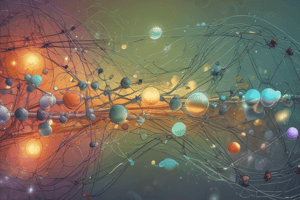Podcast
Questions and Answers
What characterizes an exergonic reaction?
What characterizes an exergonic reaction?
- It requires an input of energy to proceed.
- It proceeds with a net release of free energy. (correct)
- It occurs spontaneously without energy change.
- It absorbs free energy from its surroundings.
Which statement correctly describes the relationship between exergonic and endergonic reactions?
Which statement correctly describes the relationship between exergonic and endergonic reactions?
- Endergonic reactions do not release energy.
- An exergonic reaction is the reverse of an endergonic reaction. (correct)
- They are both energy-releasing processes.
- Exergonic reactions cannot occur without endergonic reactions.
What happens during an endergonic reaction?
What happens during an endergonic reaction?
- It has no effect on the system's energy balance.
- Free energy is absorbed from its surroundings. (correct)
- Free energy is released to the surroundings.
- The reaction proceeds spontaneously.
What can be inferred about the energy dynamics of a chemical reaction that is classified as downhill?
What can be inferred about the energy dynamics of a chemical reaction that is classified as downhill?
Which of the following best defines an endergonic process?
Which of the following best defines an endergonic process?
If a chemical process is exergonic in one direction, what can be said about the reverse process?
If a chemical process is exergonic in one direction, what can be said about the reverse process?
What characterizes an exergonic reaction?
What characterizes an exergonic reaction?
Which statement is false regarding the reverse of an exergonic reaction?
Which statement is false regarding the reverse of an exergonic reaction?
How can the energy change of an exergonic reaction be described?
How can the energy change of an exergonic reaction be described?
Which of the following accurately contrasts exergonic and endergonic reactions?
Which of the following accurately contrasts exergonic and endergonic reactions?
What is the energy relationship between the reactants and products in an exergonic reaction?
What is the energy relationship between the reactants and products in an exergonic reaction?
Which of the following descriptions applies exclusively to endergonic reactions?
Which of the following descriptions applies exclusively to endergonic reactions?
When considering both types of reactions, how are exergonic and endergonic processes inversely related?
When considering both types of reactions, how are exergonic and endergonic processes inversely related?
Which statement is true for all chemical reactions classified as exergonic?
Which statement is true for all chemical reactions classified as exergonic?
Flashcards are hidden until you start studying
Study Notes
Exergonic Reactions
- Defined as reactions that release free energy, making them energetically favorable.
- In exergonic reactions, energy is available for performing work.
- Often referred to as "downhill" processes, indicating a decrease in free energy.
Endergonic vs. Exergonic
- Endergonic reactions absorb free energy from their surroundings, leading to an increase in free energy.
- Reverse reactions of exergonic processes are endergonic, requiring energy input to proceed.
Key Characteristics
- Products in an exergonic reaction have lower total energy compared to reactants, contrary to what's suggested in incorrect interpretations.
- Not all reactants necessarily convert into products; reactions may reach equilibrium instead of going to completion.
Implications
- Understanding these energy dynamics is essential in biochemical and metabolic pathways where energy conservation and transfer are crucial.
- The concept of Gibbs free energy is central to predicting the spontaneity and direction of chemical reactions.
Studying That Suits You
Use AI to generate personalized quizzes and flashcards to suit your learning preferences.




